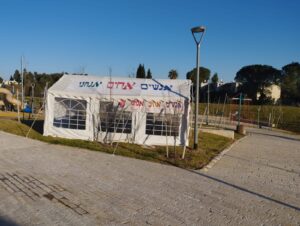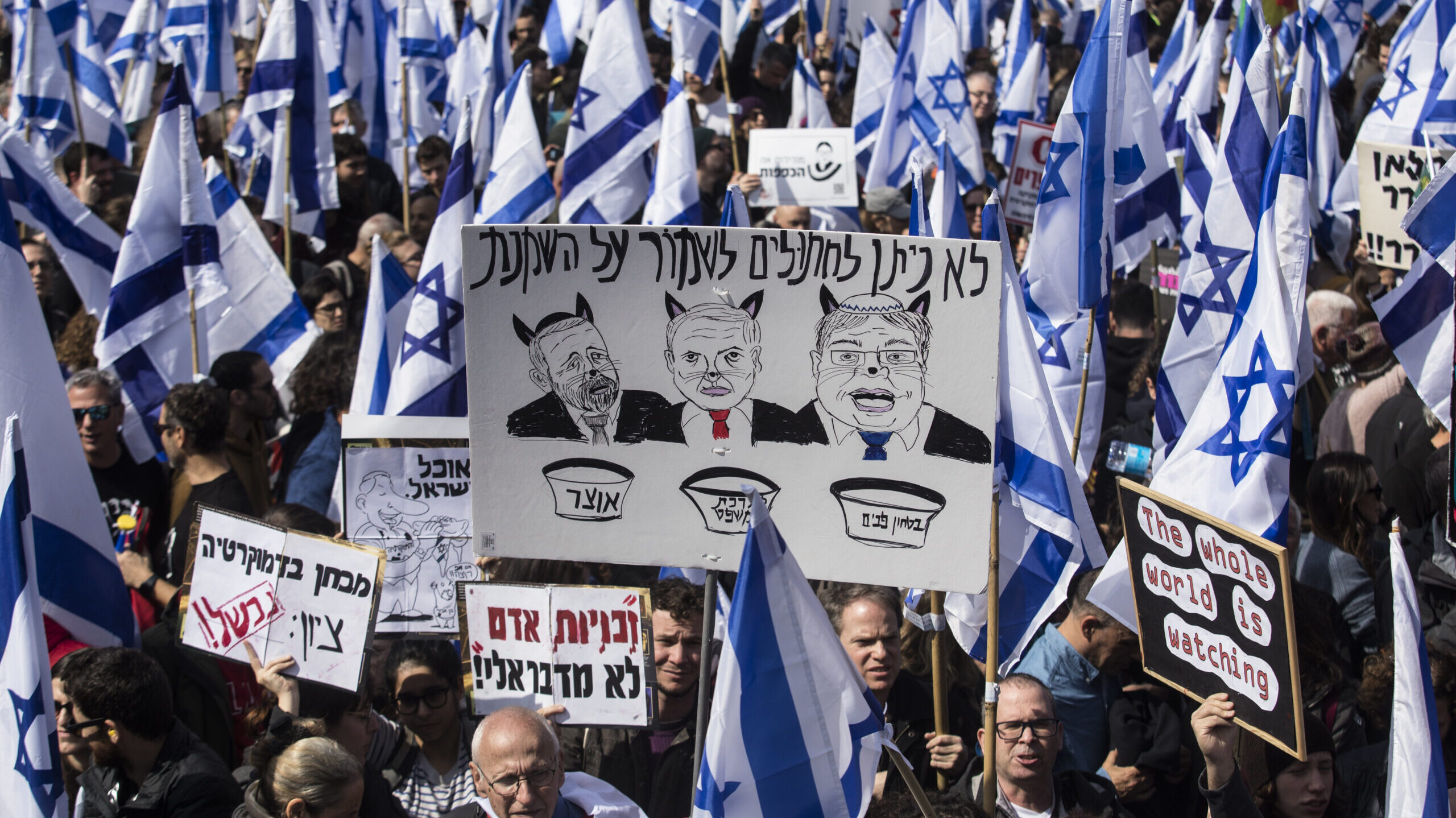As Israelis Struggle To Listen, Be Heard, Political Debate Escalates
Social media is fanning the flames in a country that still suffers from the painful memory of the assassination of Prime Minister Yitzhak Rabin in 1995
In a small Jerusalem suburb, Rabbi Eliyahu Siman Tov is busy on Wednesday setting up a tent after going shopping for an event to be held that evening, to which he has invited people from all walks of life to come and talk about the debate which is raging in Israel.
“There is talk about a civil war and other awful things. This cannot continue,” he told The Media Line. “This is not what most of the people want; people want to be together, united. There is outcry from the public – let’s talk!”
Israel is being torn apart from within. The flames from the debate on the contentious judicial reforms brought forward by the government have engulfed the country. Tens of thousands of Israelis have taken to the streets every week for almost two months and the massive demonstrations are expected to continue, perhaps even intensify.

The dialogue tent set up in Jerusalem by Rabbi Eliyahu Siman Tov. (Courtesy)
“This is not just any argument,” said Miriam Peretz, an educator and former presidential candidate. “This is about the essence of the country; the values Israel will be based on.”
The government already has begun to put forward legislation on the sweeping reforms, which include giving the parliament the ability to override supreme court rulings with a simple majority and curtailing the judicial review that the courts have over legislation. In addition, lawmakers from the ruling coalition will have more seats on the judicial selection committee. Also, legal advisers to ministries – currently civil servants – will be allowed to be political appointments.
The opposition believes the reforms severely undermine Israeli democracy by weakening the courts and giving too much power to the ruling coalition.
From politicians calling for armed resistance, to protesters saying the reforms are the end of the country’s existence and referring to the opposing camps as enemies or traitors, the terminology being used by both sides is extreme and polarizing.
It is also dangerous.
There has been an outpouring of criticism from Israelis about the reforms, as well as warnings from abroad. The business community in Israel also has voiced its concern, with international trade and credit companies offering their own cautions. The market in Israel has been shaky, and the shekel, Israel’s currency, continues to lose value against the dollar.
As the debate intensifies and the language escalates, the price could be even higher.
There is talk about a civil war and other awful things. This cannot continue. This is not what most of the people want; people want to be together, united. There is outcry from the public – let’s talk!
Israel’s President Isaac Herzog has called on the sides to engage in dialogue which he offered to sponsor. He has proposed a plan of his own, but so far there has been no real response from either camp.
“Despite the differences, despite the arguments – we must maintain our unity. We must talk. We must show responsibility. We must find a solution. We cannot afford anything else,” Herzog tweeted, after warning several days earlier that Israel “is a moment before a collision, even a violent collision, a barrel of explosives before a blast.”
A survey conducted by the Israel Democracy Institute earlier this week showed an overwhelming majority of Israelis support a compromise regarding the reforms. But in the halls of the Knesset, Israel’s parliament, a compromise does not appear near.
Israeli media has reported that the head of the Shin Bet security agency, Ronen Bar, called Prime Minister Binyamin Netanyahu and Justice Minister Yariv Levin, urging them to calm the public discourse before it becomes violent. The reports also said that Bar spoke to Opposition Leader Yair Lapid.
Political leaders on both sides have said they are willing to talk, but neither side has made movements to do so.
The country still suffers from the painful memory of the assassination of Prime Minister Yitzhak Rabin in 1995. Rabin was murdered by a man who opposed the peace agreements Israel signed with the Palestinians; The assassination came after months of build-up in which Israelis debated and fought over the accords.
“The incitement before the assassination was less than what it is now,” Peretz warned. “I am scared. Someone could do something crazy. I pray we do not wait for such a moment that will unite us, where we will all cry. I hope we do not get there.”
“The only thing that can prevent us from this is a leadership on both sides that calms things down and does not call for violence,” she added.
Peretz is especially concerned about the role of social media in fanning the flames.
“Israel was always polarized – immigrants coming from all around the world, each with their own shade, color and opinion,” Peretz said. “But social media has further polarized the society. People write whatever they want, incite and tell lies.”
“Social media enables further polarization, it is easier to be violent online,” according to Dr. Tali Gazit, from the Department of Information Science at Bar-Ilan University. “The extremism we see online will continue offline. This increases the chance for violence.”
Gazit also pinpoints the sophisticated algorithms used by hi-tech conglomerates like Meta and Google, which expose users to content similar to their own opinions and then some, adding slightly more extreme content that encourages further engagement.
“Social media feeds us what we want to see,” she explained.
“This makes people change their minds and normalizes extreme sentiments,” Gazit told The Media Line. “It becomes normal to say really harsh things.”
Rabbi Siman Tov is using social media to promote dialogue. He received hundreds of positive responses for his call for dialogue.
“I see the extreme tension, the lava boiling beneath the surface,” he said. “I want to make this a chance, not only to heal the wounds, but to create a chance for connection. We need to live with each other, not only next to each other.”
“Freedom of expression is one of the good things about social media, this has brought greater democracy and greater ability to express liberal ideas; I wouldn’t want it otherwise,” said Gazit. “But in the current atmosphere, I am very concerned because the rift is very big and it feels like we are on the verge of an explosion.”
Siman Tov feels the heated debate in-house. His brother takes part in the weekly demonstrations in Tel Aviv against the government and his son votes for left-wing parties.
“We have really intense debates, but we do it with love,” he added with a gentle laugh.
Indeed, the two opposing, almost warring sides, appear to have stopped listening to each other. This will have a lasting effect on Israeli society, many say.
We have lost empathy and compassion. This is a threat to the fabric of society. The sides do not hear each other’s pain.
“The reform may pass in its entirety and may end up being not so destructive and it may be changed, or softened or not even pass,” wrote Shivi Froman, a resident of Tekoa, a settlement in the Etzion bloc south of Jerusalem, and a social activist. “But the way in which it is being led will leave us scarred and injured for many years, with a trail of victims along the way.”
This sentiment of people not hearing or listening to each other has been echoed among many.
“We have lost empathy and compassion. This is a threat to the fabric of society,” said Peretz. “The sides do not hear each other’s pain.”
“My goal is for people to get to know each other and their opinions, when you get to know people, you are less suspicious,” said Siman Tov. “If we don’t stop this, we might see violence.”
Siman Tov hopes his dialogue tent on Wednesday will be the first of many events, since he feels that there is a thirst in the public for such opportunities.
The current fissures also are a direct result of five consecutive elections in just over four years which highlighted political divisions. And Netanyahu’s corruption trial has positioned his supporters and opponents against each other in a discussion that has long transcended the trial itself.
“The discourse on both sides is full of fearmongering,” said Gazit.
When people are scared, they might be pushed to do terrible things, some warn.
Peretz, who lost two of her sons during their military service, remains optimistic despite her personal hardship and the grim atmosphere in the country.
“Reconciliation will come like labor in childbirth, there will be a lot of pain and many contractions, but in the end, it will come,” she said. “From the sparks of the debate, maybe something new will be born.”


